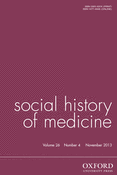-
Views
-
Cite
Cite
Petros Bouras-Vallianatos, Ann Clark Patricia, A Cretan Healer's Handbook in the Byzantine Tradition: Text, Translation and Commentary, Social History of Medicine, Volume 26, Issue 4, November 2013, Pages 809–811, https://doi.org/10.1093/shm/hkt067
Close - Share Icon Share
Extract
Patricia Ann Clark's book comprises an introduction, edition and translation of a medical handbook, copied and owned by Nikolaos-Konstantinos Theodorakis (1891–1979), a Greek healer from the island of Crete. The text belongs to the Byzantine tradition of iatrosophia. This is a somewhat neglected category of medical texts, consisting of usually anonymous collections of recipes, which are written in a simple way, so that they can be used in daily practice. The publication reflects a recent resurgence of interest in Byzantine and post-Byzantine therapeutic manuals.1
The book follows what is in effect a general-to-specific approach. In the first chapter, Clark provides an overview of iatrosophia from Byzantium to the Modern Greek period. She uses the term ‘popular’ advisedly to describe examples of post-Byzantine iatrosophia, emphasising the many elements of ‘popular medicine’ such as magic spells and biblical lore to be found in them. Chapter 2 sets out to put Cretan traditional healers in context by concentrating on the period between the sixteenth and nineteenth centuries. The author refers to a variety of medical professionals, who can be roughly divided into learned physicians, physikoi, and empirical practitioners, empeirikoi or praktikoi. Clark illustrates successfully the central role of the latter, especially in the years following the Ottoman occupation of the island in 1669 when, due to the high levels of emigration among the learned elite, there was a subsequent decline in educational and medical institutions on the island. At this point, I must note that I disagree with the way the author has chosen to transliterate the Modern Greek plural for practical and empirical healers, using praktiki and empiriki rather than the arguably more correct praktikoi and empeirikoi. The use of an ‘i’ to transliterate for Greek ‘ι’, ‘η’, ‘υ’, ‘ει’ and ‘οι’ could be confusing for the reader since the same transliteration would necessarily be also applied to ‘πρακτική’ or ‘εμπειρική’, denoting ‘medical practice’ or ‘empirical medicine’ rather than groups of physicians.2




